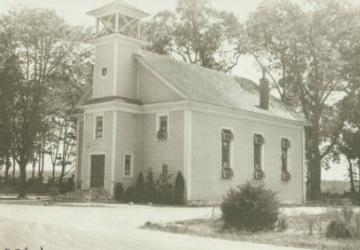

Roxana is one of only two communities in Delaware for which the corporation has been discontinued, and it ceased to exist as a town. Its location was in southern Sussex County near the intersection of Zion Church Road (Route 20) and Roxanna Road (Route 17). Originally called Centreville, it was renamed Roxana in the second half of the nineteenth century. It is said that the Town’s name was derived by combining the first names of two cousins, Roxie and Ann Wilgus, who were members of a prominent local family that operated a store and other businesses in the community at the time.
Roxana was incorporated in March 1909 as the “Commissioners of Roxana.” The Incorporating Act instructed that the Town be surveyed but contained no indication of what would be generally considered to be within the limits of the Town. The Act called for an election to be held annually with electors being white males citizens of the Town who were age 21 or over. They were to elect three Commissioners, an Alderman, an Assessor, and a Treasurer who were all to be freeholders within the Town. Required to hold twelve meetings annually, the Commissioners were to choose a President to preside at all meetings and a Secretary to record the minutes. The Commissioners were to provide sanitary measures for the health of citizens in the Town; to abate obstructions and nuisances in the streets, lanes, gutters, and sidewalks; to fix the boundaries of and improve, extend, and widen streets; to direct the paving and graveling of footpaths; to place gutter stones and curbs; to prescribe the extent of steps, porches, cellar doors and other inlets into lots, and to protect shade trees along the streets. The Act specifically provided for monies with which to maintain the roads and streets by indicating the $600 was to be levied on the Town’s citizens as road taxes and also by requiring the Levy Court of Sussex County to allocate $200 for the purpose of road maintenance. The Commissioners were also empowered to regulate and charge a fee for the permitting and licensing of auctions and auctioneers, the storage of gunpowder and other dangerous combustible materials, and shows, exhibitions and public amusements of all kinds. The Alderman, with the assistance of the Commissioners and any Constables, was charged with keeping the peace in the Town. These officials were empowered to suppress the disorderly conduct of any person, as well as to prevent any turbulent gathering in the streets, or in any house after dark, or on the Sabbath. They were also to prevent bonfires, the firing of guns and letting off of fireworks. The Act also indicated that the Commissioners had full power over the ditches and gutters and that no ditch company could tax residents of the Town directly; all taxes were to be directed to the corporation. There is no indication of how much monies could be charged to the Town’s residents in taxes, just that these would be assessed.1
Within a month of its incorporation, a law authorized the Commissioners of Roxana to borrow $1,000 for the purpose of improving the streets. A special tax was to be levied in order to raise funds sufficient to pay the interest on this debt and also to create a sinking fund in order to redeem the issued bonds when due.2
In 1921, twelve years after its incorporation, the Incorporating Act was revoked.3
CITATIONS in Del. Laws
1 25 Del. Laws, c. 211 (1909) [pp. 461-76]
2 25 Del. Laws, c. 210 (1909) [pp. 458-60]
3 32 Del. Laws, c. 145 (1921) [p. 428]
Delaware Laws from 1935 to present can be found online at http://delcode.delaware.gov/sessionlaws/
jnl / April 18, 2019
Related Topics: Delaware History, Roxana, Town and City Histories